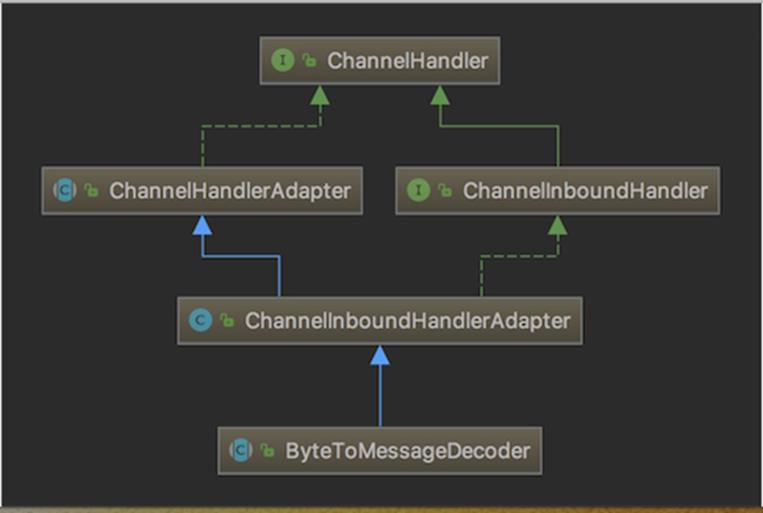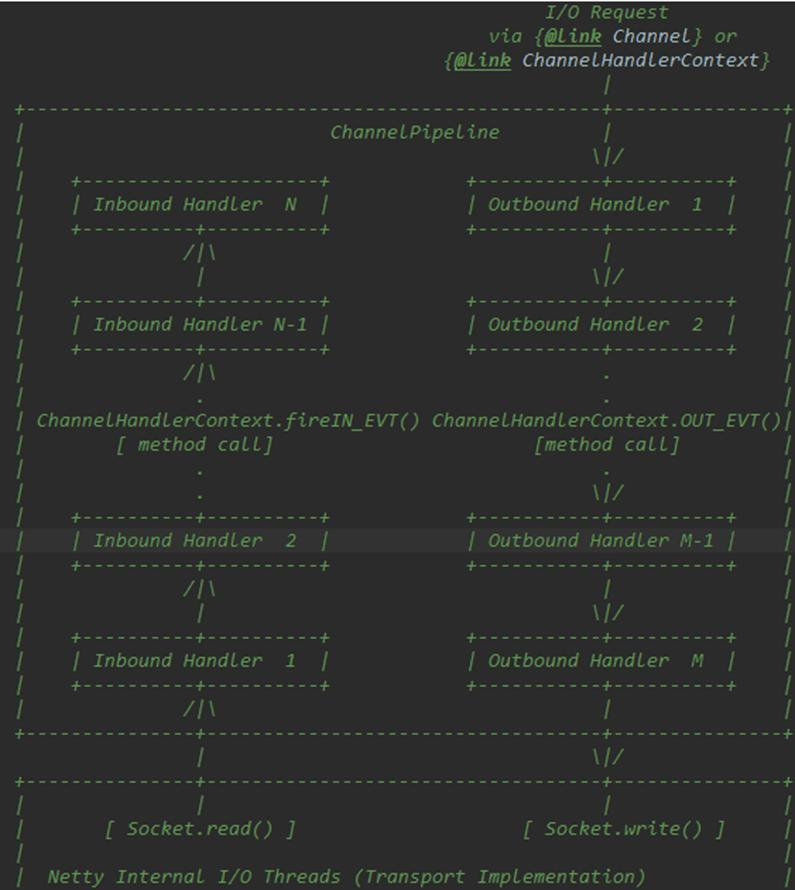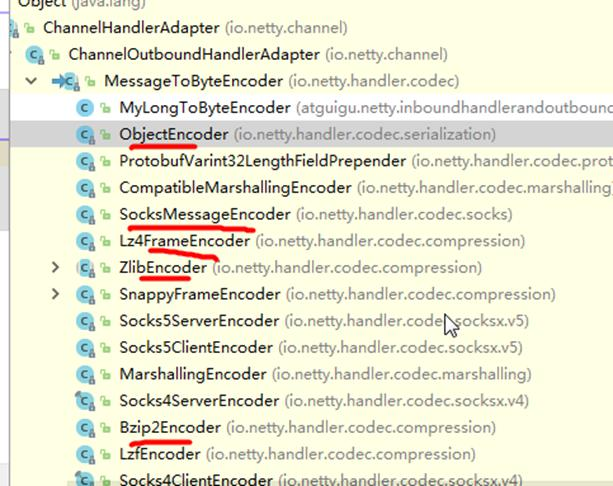Netty 编解码器和 handler 的调用机制
1.基本说明
1) netty 的组件设计: Netty 的主要组件有 Channel、 EventLoop、 ChannelFuture、 ChannelHandler、 ChannelPipe 等
2) ChannelHandler 充当了处理入站和出站数据的应用程序逻辑的容器。 例如, 实现 ChannelInboundHandler 接口(或
ChannelInboundHandlerAdapter) , 你就可以接收入站事件和数据, 这些数据会被业务逻辑处理。 当要给客户端
发 送 响 应 时 , 也 可 以 从 ChannelInboundHandler 冲 刷 数 据 。 业 务 逻 辑 通 常 写 在 一 个 或 者 多 个
ChannelInboundHandler 中。 ChannelOutboundHandler 原理一样, 只不过它是用来处理出站数据的
3) ChannelPipeline 提供了 ChannelHandler 链的容器。 以客户端应用程序为例, 如果事件的运动方向是从客户端到
服务端的, 那么我们称这些事件为出站的, 即客户端发送给服务端的数据会通过 pipeline 中的一系列ChannelOutboundHandler, 并被这些 Handler 处理, 反之则称为入站的 
2.编码解码器
1) 当 Netty 发送或者接受一个消息的时候, 就将会发生一次数据转换。 入站消息会被解码: 从字节转换为另一种格式(比如 java 对象) ; 如果是出站消息, 它会被编码成字节。
2) Netty 提供一系列实用的编解码器, 他们都实现了 ChannelInboundHadnler 或者 ChannelOutboundHandler 接口。在这些类中, channelRead 方法已经被重写了。 以入站为例, 对于每个从入站 Channel 读取的消息, 这个方法会
被调用。 随后, 它将调用由解码器所提供的 decode()方法进行解码, 并将已经解码的字节转发给 ChannelPipeline中的下一个 ChannelInboundHandler。
注意:进站和出站都是想对而言
3 解码器-ByteToMessageDecoder
1) 关系继承图

2) 由于不可能知道远程节点是否会一次性发送一个完整的信息, tcp 有可能出现粘包拆包的问题, 这个类会对入站数据进行缓冲, 直到它准备好被处理.
3) 一个关于 ByteToMessageDecoder 实例分析


4 Netty 的 handler 链的调用机制
实例要求:
1) 使用自定义的编码器和解码器来说明 Netty 的 handler 调用机制
客户端发送 long -> 服务器
服务端发送 long -> 客户端
2) 案例演示

3) 结论
不论解码器 handler 还是 编码器 handler 即接收的消息类型必须与待处理的消息类型一致, 否则该 handler 不会被执行
在解码器 进行数据解码时, 需要判断 缓存区(ByteBuf)的数据是否足够 , 否则接收到的结果会期望结果可能不一致
代码:
MyServer

import io.netty.bootstrap.ServerBootstrap; import io.netty.channel.ChannelFuture; import io.netty.channel.EventLoopGroup; import io.netty.channel.nio.NioEventLoopGroup; import io.netty.channel.socket.nio.NioServerSocketChannel; public class MyServer { public static void main(String[] args) throws Exception{ EventLoopGroup bossGroup = new NioEventLoopGroup(1); EventLoopGroup workerGroup = new NioEventLoopGroup(); try { ServerBootstrap serverBootstrap = new ServerBootstrap(); serverBootstrap.group(bossGroup,workerGroup).channel(NioServerSocketChannel.class).childHandler(new MyServerInitializer()); //自定义一个初始化类 ChannelFuture channelFuture = serverBootstrap.bind(7000).sync(); channelFuture.channel().closeFuture().sync(); }finally { bossGroup.shutdownGracefully(); workerGroup.shutdownGracefully(); } } }
MyServerInitializer

import io.netty.channel.ChannelInitializer; import io.netty.channel.ChannelPipeline; import io.netty.channel.socket.SocketChannel; public class MyServerInitializer extends ChannelInitializer<SocketChannel> { @Override protected void initChannel(SocketChannel ch) throws Exception { ChannelPipeline pipeline = ch.pipeline();//一会下断点 //入站的handler进行解码 MyByteToLongDecoder //pipeline.addLast(new MyByteToLongDecoder()); pipeline.addLast(new MyByteToLongDecoder2()); //出站的handler进行编码 pipeline.addLast(new MyLongToByteEncoder()); //自定义的handler 处理业务逻辑 pipeline.addLast(new MyServerHandler()); System.out.println("xx"); } }
MyServerHandler

import io.netty.channel.ChannelHandlerContext; import io.netty.channel.SimpleChannelInboundHandler; public class MyServerHandler extends SimpleChannelInboundHandler<Long> { @Override protected void channelRead0(ChannelHandlerContext ctx, Long msg) throws Exception { System.out.println("从客户端" + ctx.channel().remoteAddress() + " 读取到long " + msg); //给客户端发送一个long ctx.writeAndFlush(98765L); } @Override public void exceptionCaught(ChannelHandlerContext ctx, Throwable cause) throws Exception { cause.printStackTrace(); ctx.close(); } }
MyClient

import io.netty.bootstrap.Bootstrap; import io.netty.channel.ChannelFuture; import io.netty.channel.EventLoopGroup; import io.netty.channel.nio.NioEventLoopGroup; import io.netty.channel.socket.nio.NioSocketChannel; public class MyClient { public static void main(String[] args) throws Exception{ EventLoopGroup group = new NioEventLoopGroup(); try { Bootstrap bootstrap = new Bootstrap(); bootstrap.group(group).channel(NioSocketChannel.class) .handler(new MyClientInitializer()); //自定义一个初始化类 ChannelFuture channelFuture = bootstrap.connect("localhost", 7000).sync(); channelFuture.channel().closeFuture().sync(); }finally { group.shutdownGracefully(); } } }
MyClientInitializer

import io.netty.channel.ChannelInitializer; import io.netty.channel.ChannelPipeline; import io.netty.channel.socket.SocketChannel; public class MyClientInitializer extends ChannelInitializer<SocketChannel> { @Override protected void initChannel(SocketChannel ch) throws Exception { ChannelPipeline pipeline = ch.pipeline(); //加入一个出站的handler 对数据进行一个编码 pipeline.addLast(new MyLongToByteEncoder()); //这时一个入站的解码器(入站handler ) //pipeline.addLast(new MyByteToLongDecoder()); pipeline.addLast(new MyByteToLongDecoder2()); //加入一个自定义的handler , 处理业务 pipeline.addLast(new MyClientHandler()); } }
MyClientHandler

import io.netty.buffer.Unpooled; import io.netty.channel.ChannelHandlerContext; import io.netty.channel.SimpleChannelInboundHandler; import io.netty.util.CharsetUtil; import java.nio.charset.Charset; public class MyClientHandler extends SimpleChannelInboundHandler<Long> { @Override protected void channelRead0(ChannelHandlerContext ctx, Long msg) throws Exception { System.out.println("服务器的ip=" + ctx.channel().remoteAddress()); System.out.println("收到服务器消息=" + msg); } //重写channelActive 发送数据 @Override public void channelActive(ChannelHandlerContext ctx) throws Exception { System.out.println("MyClientHandler 发送数据"); //ctx.writeAndFlush(Unpooled.copiedBuffer("")) ctx.writeAndFlush(123456L); //发送的是一个long //分析 //1. "abcdabcdabcdabcd" 是 16个字节 //2. 该处理器的前一个handler 是 MyLongToByteEncoder //3. MyLongToByteEncoder 父类 MessageToByteEncoder //4. 父类 MessageToByteEncoder /* public void write(ChannelHandlerContext ctx, Object msg, ChannelPromise promise) throws Exception { ByteBuf buf = null; try { if (acceptOutboundMessage(msg)) { //判断当前msg 是不是应该处理的类型,如果是就处理,不是就跳过encode @SuppressWarnings("unchecked") I cast = (I) msg; buf = allocateBuffer(ctx, cast, preferDirect); try { encode(ctx, cast, buf); } finally { ReferenceCountUtil.release(cast); } if (buf.isReadable()) { ctx.write(buf, promise); } else { buf.release(); ctx.write(Unpooled.EMPTY_BUFFER, promise); } buf = null; } else { ctx.write(msg, promise); } } 4. 因此我们编写 Encoder 是要注意传入的数据类型和处理的数据类型一致 */ // ctx.writeAndFlush(Unpooled.copiedBuffer("abcdabcdabcdabcd",CharsetUtil.UTF_8)); } }
MyByteToLongDecoder
解码器

import io.netty.buffer.ByteBuf; import io.netty.channel.ChannelHandlerContext; import io.netty.handler.codec.ByteToMessageDecoder; import java.util.List; public class MyByteToLongDecoder extends ByteToMessageDecoder { /** * * decode 会根据接收的数据,被调用多次, 直到确定没有新的元素被添加到list * , 或者是ByteBuf 没有更多的可读字节为止 * 如果list out 不为空,就会将list的内容传递给下一个 channelinboundhandler处理, 该处理器的方法也会被调用多次 * * @param ctx 上下文对象 * @param in 入站的 ByteBuf * @param out List 集合,将解码后的数据传给下一个handler * @throws Exception */ @Override protected void decode(ChannelHandlerContext ctx, ByteBuf in, List<Object> out) throws Exception { System.out.println("MyByteToLongDecoder 被调用"); //因为 long 8个字节, 需要判断有8个字节,才能读取一个long if(in.readableBytes() >= 8) { out.add(in.readLong()); } } }
解码器-ReplayingDecoder
1) public abstract class ReplayingDecoder<S> extends ByteToMessageDecoder
2) ReplayingDecoder 扩展了 ByteToMessageDecoder 类, 使用这个类, 我们不必调用 readableBytes()方法。 参数 S指定了用户状态管理的类型, 其中 Void 代表不需要状态管理
3) 应用实例: 使用 ReplayingDecoder 编写解码器, 对前面的案例进行简化 [案例演示
MyByteToLongDecoder2

import io.netty.buffer.ByteBuf; import io.netty.channel.ChannelHandlerContext; import io.netty.handler.codec.ReplayingDecoder; import java.util.List; public class MyByteToLongDecoder2 extends ReplayingDecoder<Void> { @Override protected void decode(ChannelHandlerContext ctx, ByteBuf in, List<Object> out) throws Exception { System.out.println("MyByteToLongDecoder2 被调用"); //在 ReplayingDecoder 不需要判断数据是否足够读取,内部会进行处理判断 out.add(in.readLong()); } }
4) ReplayingDecoder 使用方便, 但它也有一些局限性:
1. 并 不 是 所 有 的 ByteBuf 操 作 都 被 支 持 , 如 果 调 用 了 一 个 不 被 支 持 的 方 法 , 将 会 抛 出 一 个UnsupportedOperationException。
2. ReplayingDecoder 在某些情况下可能稍慢于 ByteToMessageDecoder, 例如网络缓慢并且消息格式复杂时,
消息会被拆成了多个碎片, 速度变慢 。
6 其它编解码器
1) LineBasedFrameDecoder: 这个类在 Netty 内部也有使用, 它使用行尾控制字符(\n 或者\r\n) 作为分隔符来解析数据。
2) DelimiterBasedFrameDecoder: 使用自定义的特殊字符作为消息的分隔符。
3) HttpObjectDecoder: 一个 HTTP 数据的解码器
4) LengthFieldBasedFrameDecoder: 通过指定长度来标识整包消息, 这样就可以自动的处理黏包和半包消息。
7 其它编码器






